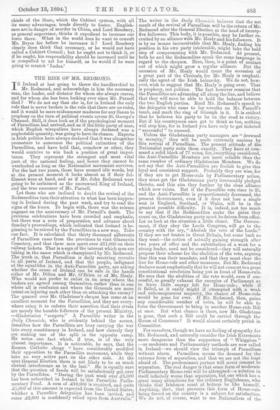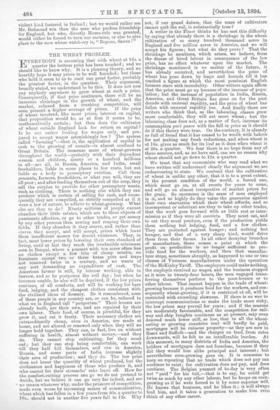THE RISE OF MR. REDMOND.
IS Ireland at last going to throw the handkerchief to Mr. Redmond, and acknowledge in him the necessary man, the leader, and dictator for whom she always craves, and for whom she has been looking ever since Mr. Parnell died ? We do not say that she is, for in Ireland the only rule that is never broken is the rule that there are no rules, and it would be mere midsummer madness for any Saxon to prophesy on the turn of political events across St. George's Channel. Still, it does look as if the psychological moment of Parnellism had arrived, and as if the little party of nine, which English wirepullers have always declared was a neglectable quantity, was going to have its chance. Experts in Irish politics have always declared that it was altogether premature to announce the political extinction of the Parnellites, and have held that, somehow or other, they would contrive to win back a position of great impor- tance. They represent the strongest and most vital part of the national feeling, and hence they cannot be overlooked as long as the Nationalist movement survives. For the last two years, these have seemed idle words, but at the present moment it looks almost as if their ful- filment were at hand, and as if Mr. John Redmond were going to be acclaimed as the uncrowned. King of Ireland, and the true successor of Mr. Parnell.
Let those who are inclined to doubt the revival of the Redmondites turn their attention to what has been happen- ing in Ireland during the past week, and try to read the signs of the times. To begin with, there was the solemn pageant on the anniversary of Mr. Parnell's death. The previous celebrations have been crowded and emphatic, but there was a note of preparation and advance about Sunday's proceedings, which indicated that Ireland is be- ginning to be stirred by the Parnellites in a new way. Take one fact. It is calculated that thirty thousand adherents of Parnellism came from the provinces to visit Glasnevin Cemetery, and that these men spent over £11,000 on their railway tickets. That is a sign of the interest which men are taking in the cause which is championed by Mr. Redmond. The truth is, that Parnellism is daily receiving recruits in all parts of Ireland, and that the people, indignant at the squabbles in the Anti-Parnellite party, are asking whether the cause of Ireland can be safe in the hands either of Mr. Dillon and Mr. O'Brien or of Mr. Healy. Who would not prefer to enlist in an army where the leaders are agreed among themselves, rather than in one where all is confusion and where the Generals are more intent on injuring each other than on attacking the enemy ? The quarrel over Mr. Gladstone's cheque has come at an excellent moment for the Parnellites, and they are every- where using it to enforce their assertion that their rivals are merely the humble followers of the present Ministry, —Gladstonian " soupers." A Parnellite writer in the Daily Chronicle, who is evidently behind the scenes, describes how the Parnellites are busy carrying the war into every constituency in Ireland, and how cleverly they are making use of the split in the opposite camp. He notes one fact which, if true, is of the very utmost importance. It is noticeable, he says, that the Roman Catholic clergy " have considerably modified their opposition to the Parnellite movement, while they take no very active part on the other side, At the next General Election there is not likely to be as much clerical interference as in the last." He is equally sure that the question of funds will be satisfactorily got over by the Parnellites. During the past week over £1,000 has been subscribed in Ireland to the Parnellite Parlia- mentary Fund. A sum of £10,000 is required, and quite £5,000 of this amount is expected from the United States, whither a Parnellite delegation has been invited, and some £2,000 is confidently relied upon from Australia." The writer in the Daily Chronicle believes that the net result of the revival of Parnellism will be the return of Mr. Redmond after the General Election at the head of twenty- five followers. This body, it is possible, may be further re- cruited by an alliance with Mr. Healy and his followers. It is by no means inconceivable that Mr. Healy, finding his position in his own party intolerable, might take the bold step of compromising with Mr. Redmond. At present, both he and the Redmondites speak the same language in regard to the cheques. Here, then, is a point of contact out of which might grow a regular alliance. But the secession of Mr. Healy would mean the secession of a great part of the Clericals, for Mr. Healy is emphati- cally the agent of the Irish heirarchy. We do not, how- ever, wish to suggest that Mr. Healy is going over. That is prophecy, not politics. The fact however remains that the Parnellites are advancing all along the line, and believe that they will soon be able to hold the balance between the two English parties. Read Mr. Redmond's speech to the delegates who came to lay wreaths on Mr. Parnell's tomb, and mark the ring of triumph in it. It is evident that he believes his party to be on the road to victory. But if his countrymen once get to think so too, nothing will stop him, for in Ireland you have only to get ticketed " successful " to succeed.
Unless the G-la.dstonian party managers are " drowned in security," they will be made extremely anxious by this revival of Parnellism. The present attitude of the Nationalist party suits them exactly. They have at com- mand a solid block of 77 votes, for, everything considered, the Anti-Parnellite Members are more reliable than the same number of ordinary Gladstonian Members. We do not say that the Anti-Parnellites are foolish to give this loyal and consistent support. Probably they are wise, for if they are to get Home-rule by Parliamentary action, they must get the Gladstonian party irrevocably pledged thereto, and this aim they further by the close alliance which now exists. But if the Parnellite vote rises to 25, and the Anti-Parnellite is proportionately decreased, the present Government, even if it does not lose a single seat in England, Scotland, or Wales, will be in the greatest possible difficulty. It is, indeed, not too much to say that if the Redmondites make the gains they count on, the Gladstonian party must be driven from office.. Let us look at the situation a little closer. The Govern- ment, if they obey the Leeds Congress, will go to the country with the cry, " Abolish the veto of the Lords." If they are not beaten in Great Britain, but come back as. they went—the notion of actually gaining strength after two years of office and the substitution of a weak for a. strong leader, need. not be considered—they will naturally propose their scheme for the abolition of the veto, arguing that this was their mandate, and that they must clear the• line for Home-rule and other measures. But Mr. Redmond. declares most emphatically that he will not consent to a great constitutional revolution being put in front of Home-rule.. He sees that the abolition of the veto would, even if suc- cessful, so greatly exhaust the energies of Parliament as to leave little energy left for Home-rule; while if it failed, as it easily might if attempted with a weak and unhomogeneous majority, the chance of Home-rule. would be gone for ever. If Mr. Redmond, then, gains any considerable number of votes, he will be able to force the Government to bring in another Home-rule Bill at once. But what chance is there, now Mr. Gladstone is gone, that such a Bill could. be carried through the House of Commons ? It would almost certainly perish in, Committee.
For ourselves, though we have no feeling of sympathy for Mr. Redmond, and naturally consider the Irish Extremists. more dangerous than the supporters of " Whiggism —as moderate and Parliamentary methods are now called in Ireland—we should view the triumph of Parnellism, without alarm. Parnellism means the demand for the extreme form of separation, and that we are not the least afraid of. The predominant partner will never consent to separation. The real danger is that some form of moderate Parliamentary Home-rule will be attempted—a solution in itself infinitely worse than separation, but one which has a great many attractions for the ordinary Englishman, who thinks that Irishmen must at bottom be like himself. 4, Anything, ther, that prevents this form of Home-rule being forced on the country is a subject for satisfaction. We do not, of course, want to see Nationalism of the violent kind fostered in Ireland ; but we would rather see Mr. Redmond win than the men who profess friendship for England, but who, directly Home-rule was granted, would either be forced to turn our enemies, or else to give place to the men whose watch-cry is, "Begone, Saxon ! "



















































 Previous page
Previous page